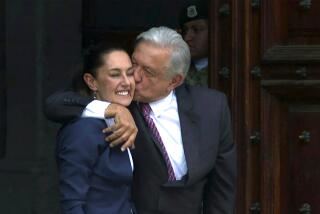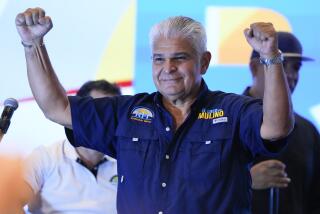SOUTH AMERICA : Chile’s President-Elect Vows to Fight for New Constitution
- Share via
SANTIAGO, Chile — When President-elect Eduardo Frei takes office in March, Chile’s democracy will still be bridled by a 1980 constitution, written under the dictatorship of Gen. Augusto Pinochet.
Frei, 51, vows that he will fight to change the charter. His supporters say it contains undemocratic restrictions and restraints--which the conservative opposition calls stabilizing checks and balances.
Although Frei’s center-left coalition won the Dec. 11 presidential race by a huge margin, it did not win enough congressional seats to amend the constitution without help from the opposition. The voting “left everything in balance--or in gridlock, depending on your point of view,” a foreign diplomat said.
Pinochet, 78, gave up government power and restored democracy in March, 1990. But the constitution allows him to stay on as commander of the army until 1997. The constitution also allows eight “designated” senators, appointed before Pinochet left the presidency, to remain in office until 1997.
The designated senators give the opposition a Senate majority. That majority has blocked attempts to pass several reforms, including one that would give the president authority to remove and appoint commanders of the military services.
Frei, a Christian Democratic senator, defeated conservative Sen. Arturo Alessandri in the Dec. 11 elections. Alessandri received less than 25% of the vote to Frei’s 58%, while four other candidates won the remaining 17%.
Frei’s coalition, which includes the Socialist Party and the social democratic Party for Democracy, is the same alliance now in power with Christian Democratic President Patricio Aylwin. Aylwin was elected in 1989, after 16 years of Pinochet dictatorship, in a negotiated transition to democracy that included a commitment to abide by the constitution.
In 1989, the coalition won a 72-seat majority in the 120-member Chamber of Deputies. The latest election decreased the coalition’s representation to 70 seats, according to preliminary returns that are subject to review by electoral authorities. In the 46-member Senate, where 18 seats were up for election, the coalition’s bloc was reduced from 22 to 21 seats.
As a result, the coalition still falls far short of the three-fifths majority of both houses required for most constitutional amendments and the two-thirds needed for fundamental changes such as eliminating the designated senators.
Since the elections, Frei has acknowledged that he has no choice but to negotiate with the conservative opposition for its cooperation in Congress. “I believe that the only road is one of agreements,” he told a news conference. Constitutions, he added, are more stable if they are written with the broadest possible agreement, which “assures a tranquil democratic process.”
But he emphasized that he wants to restore the president’s constitutional authority to appoint military commanders. “This is a problem of principles, and we are always going to fight for that principle,” he said.
He sidestepped the question of whether he will ask Pinochet to resign but said he expects to have “excellent relations” with the armed forces. He denied that the military exercises “tutelage” over the civilian government. “The armed forces have respected the legally constituted and sovereignly elected government during these years, and the government has respected the professional role of the armed forces,” he said.
Most analysts agree that Frei’s leverage for negotiating major constitutional changes is linked to the expiration of the designated senators’ terms in 1997. If the opposition continues to reject key amendments until then, the appointment of new designated senators probably would give Frei an ample majority for pushing the changes through.
In 1997, predicted one close adviser to Frei, the government will finish “implanting the real constitution that is going to govern Chile in the 21st Century.”
More to Read
Sign up for Essential California
The most important California stories and recommendations in your inbox every morning.
You may occasionally receive promotional content from the Los Angeles Times.













